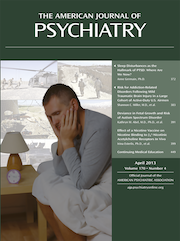Association Between Maternal Depressogenic Cognitive Style During Pregnancy and Offspring Cognitive Style 18 Years Later
Abstract
Objective
Understanding the origins of negative cognitive style could provide a means to prevent adult depression. Cognitive style is an important target for intervention because although it is not possible to remove the stress and adversities in people’s lives, it may be possible to modify interpretation of such adversities through cognitive style. Children may develop a negative cognitive style through modeling the style of their mothers. However, findings have been inconsistent on the association. The authors tested the hypothesis that there is an independent association between maternal and offspring depressogenic cognitive style.
Method
Data from over 4,000 mothers and children from the Avon Longitudinal Study of Parents and Children cohort study in the United Kingdom were used to investigate the association between maternal depressogenic cognitive style before the offspring’s birth and the offspring’s depressogenic cognitive style at age 18.
Results
A positive association was observed between maternal and offspring cognitive styles: a one-standard-deviation increase in maternal depressogenic cognitive style score during pregnancy was significantly associated with a mean increase of 0.1 standard deviations in offspring depressogenic cognitive style score at age 18. This effect remained after adjusting for maternal and offspring depression and explained 21% of the association between maternal and offspring depression.
Conclusions
Although the mechanisms remain to be elucidated, the findings are consistent with the idea that a mother’s cognitive style (irrespective of her depression status) influences that of her child. This suggests that interventions to improve a mother’s cognitive style could help prevent her offspring from developing depression during adulthood.



